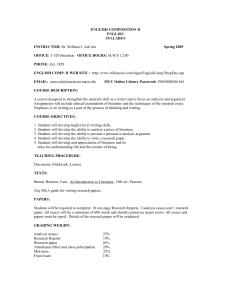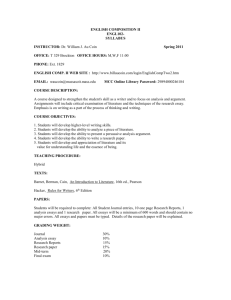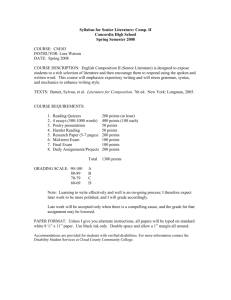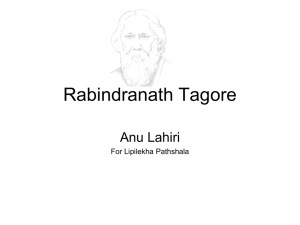AP English Literature and Composition
advertisement
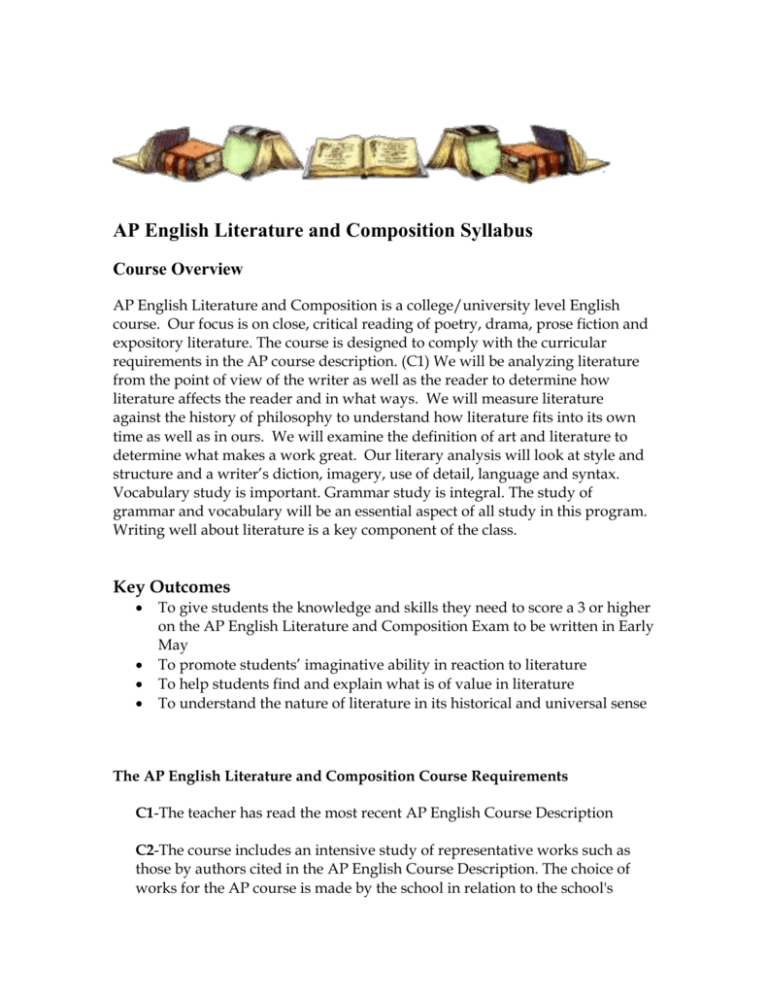
AP English Literature and Composition Syllabus Course Overview AP English Literature and Composition is a college/university level English course. Our focus is on close, critical reading of poetry, drama, prose fiction and expository literature. The course is designed to comply with the curricular requirements in the AP course description. (C1) We will be analyzing literature from the point of view of the writer as well as the reader to determine how literature affects the reader and in what ways. We will measure literature against the history of philosophy to understand how literature fits into its own time as well as in ours. We will examine the definition of art and literature to determine what makes a work great. Our literary analysis will look at style and structure and a writer’s diction, imagery, use of detail, language and syntax. Vocabulary study is important. Grammar study is integral. The study of grammar and vocabulary will be an essential aspect of all study in this program. Writing well about literature is a key component of the class. Key Outcomes To give students the knowledge and skills they need to score a 3 or higher on the AP English Literature and Composition Exam to be written in Early May To promote students’ imaginative ability in reaction to literature To help students find and explain what is of value in literature To understand the nature of literature in its historical and universal sense The AP English Literature and Composition Course Requirements C1-The teacher has read the most recent AP English Course Description C2-The course includes an intensive study of representative works such as those by authors cited in the AP English Course Description. The choice of works for the AP course is made by the school in relation to the school's overall English curriculum sequence, so that by the time the student completes AP English Literature and Composition she or he will have studied during high school literature from both British and American writers, as well as works written in several genres from the sixteenth century to contemporary times. The works selected for the course should require careful, deliberative reading that yields multiple meanings. C3-The course teaches students to write an interpretation of a piece of literature that is based on a careful observation of textual details, considering the work's: -Structure, style, and themes -The social and historical values it reflects and embodies -Such elements as the use of figurative language, imagery, symbolism, and tone C4- The course includes frequent opportunities for students to write and rewrite formal, extended analyses and timed, in-class responses. The course requires: -Writing to understand: Informal, exploratory writing activities that enable students to discover what they think in the process of writing about their reading (such assignments could include annotation, freewriting, keeping a reading journal, and response/reaction papers) -Writing to explain: Expository, analytical essays in which students draw upon textual details to develop an extended explanation/interpretation of the meanings of a literary text -Writing to evaluate: Analytical, argumentative essays in which students draw upon textual details to make and explain judgments about a work's artistry and quality, and its social and cultural values C5- The AP teacher provides instruction and feedback on students' writing assignments, both before and after the students revise their work, that help the students develop: -A wide-ranging vocabulary used appropriately and effectively -A variety of sentence structures, including appropriate use of subordination and coordination -Logical organization, enhanced by specific techniques to increase coherence, such as repetition, transitions, and emphasis -A balance of generalization and specific, illustrative detail -An effective use of rhetoric, including controlling tone, establishing and maintaining voice, and achieving appropriate emphasis through diction and sentence structure Unit 1 Introduction to the Course Week 1-5 What is Literature? This unit provides the framework for our course of study. We will explore fundamental questions regarding the study of Literature such as: How do you define Literature? What makes a work great? How do we distinguish between pleasure and academic process? Students will be assigned the reading, “Reading and Writing about Literature” by Robert DiYanni in Literature: Approaches to Fiction, Poetry and Drama (1-17) This article is meant to generate a preliminary discussion on the nature of this course. Students will be given frequent opportunities to read and write in response to various forms of writing from the student text The Act of Writing edited by Ronald Conrad. Reading will be assigned in the areas of narration, writing to describe, cause and effect, writing to compare and contrast, analogy and related devices as well as argumentation and persuasion. (C4) A number of essays (3-5) will be assigned in relation to short fiction and prose in this text, where students will analyze the writing of particular authors. Classes will consist of workshopping and discussion. I will also provide student feedback on these essays to help students understand the nature of writing with purpose. (C5) Sample Works: Where the World Began Margaret Laurence Encounters Carol Shields Hidden Lessons David Suzuki How to Live to Be 200 Stephen Leacock (C4) Unit 2 The Novel Ongoing – Week 1-10 / Week 11-20 Students choose 2 novels to read and study independently from a list of possible titles. One must be from the “classics” and one modern novel. (C2) Pride and Prejudice, Frankenstein, Anna Karenina, The Scarlet Letter, Wuthering Heights, Don Quixote, Siddhartha, The Republic, Beowulf,The Canterbury Tales, Les Miserables, Great Expectations, A Passage to India, Tess of the D’Urbanvilles, Middlemarch, Ulysses Alias Grace, The Kite Runner, The Great Gatsby, Snow Falling on Cedars, The Bell Jar, Lord of the Flies, The shipping News, Life of Pi, Brave New World, Invisible Man, The Fountainhead, Fifth Business, Grapes of Wrath, The Alchemist, Love in the Time of Cholera, The Color Purple, Heart of Darkness, Night, Cry the Beloved Country, A Portrait of the Artist as a Young Man, The Stone Angel, The Divine Ryans, Fall on Your Knees, The Republic of Nothing, The Mountain and the Valley, The Stone Diaries Students must submit a paper on each work of literature near the end of each of the two terms. Conferencing and editing these papers will occur on selected days throughout the term as students will write and rewrite their extended analysis and show evidence of their ability to write for understanding and evaluation. (C4) Unit 3 Poetry Week 6-9 The Basics Students will use Sound and Sense as their primary text. I will also supply individual photocopies of poems we read and discuss in class. Some of these poems are from past AP exams and others are pieces I have collected over the years. The poetry ranges from the “classics” to modern poetic examples. (C2) I begin this unit with formal instruction on tone and voice, imagery and symbolism, rhythm and sound, as well as extensive study of figurative devices. (Sound and Sense) We explore various ways to read and explicate poems from the “Poetic Method” to “TP CASTT” to the “Five S Strategy” to explicating a poem which involves examining key sentences or phases, the speaker, the situation, major shifts and syntax. (C3) The Poets Students choose individual poets and complete a research project on the history of that poet, their influences and achievements as well as exploring the nature of their poetry. They must provide a detailed analysis of individual poems (3-5). The analysis must include an awareness of poetic technique and patterns of language. (C3) This research must then be presented to the class in the form of a power point presentation where students demonstrate their ability to verbally and visually communicate their knowledge. Unit 4 Thematic Connections Week 12The Individual in Society – Past, Present and Future This unit focuses on the roles and responsibilities of the individual in society. Diverse works of literature are used to fully explore the central theme. These works may change from year to year depending on student interest and current issues. There are three anchor texts; William Shakespeare’s Hamlet, Arthur Miller’s The Crucible and Margaret Atwood’s The Handmaid’s Tale. (C2,C3) Part I Hamlet Week 10-12 Students read and study the play as an exploration of the individual’s presentation of choice. We will examine the creation of character, the structure and development of the five act play, the question of morality and individual responsibility. An extensive examination of the role of fate verses freedom of choice is key in this study. Students will complete a variety of non evaluated, in class writing assignments. (C4) Part II The Crucible Week 13-15 Arthur Miller’s classic play has gained renewed importance in a post 911 world. The drama will be examined in historical perspectives of the Salem Witch Trials of 1692 and the separation of church and state; the McCarthy era and the role of government in the lives of the individual, as well as current issues of free speech and security. Students will explore the responsibility of the individual to and in their society. The function of social drama will be pivotal. (C3,C4) Part III The Handmaid’s Tale Week 15-17 This dystopian novel allows readers to explore a future world where the role of the individual in society is threatened. An examination of dystopia verses utopia in literature is an essential component of this unit. I will include an assignment on writing to respond in this section of the unit where students reflect on the future of individualism. (C3,C4) Assignments in this unit will fall into two categories. a) Students will be required to read a minimum of three scholarly critiques on each work of literature and submit an evaluation of these critiques. b) Students will be given a list of past AP Open Essay Questions from which to select. They must select one essay topic for each work studied, workshop their topic in groups and complete a final draft. (C5) Students must show an awareness of structure, style and theme, awareness of social and historical value and an appreciation of the use of literary elements. (C3,C5) Unit 5 Final Unit Week 18-20 Explicit Review for AP Exam An extensive review for the AP exam Multiple Choice and Essay Practice Questions. Segments of practice exams will be assigned for homework each night and discussed the next day. Student concerns and deficits are addressed in anticipation for the exam. (C5) Multiple Choice and Essay Questions practiced Timed Essays written in class Review of Exam structure and discussion of writing tips Discussion of past exam questions in preparation for the exam Student Evaluation The AP Course rewards both student achievement and effort. Individual papers will be evaluated using specific rubrics provided to students. Tests and multiple choice quizzes will be graded objectively and both will comprise a significant portion of the student grade. However, commitment will be recognized and rewarded. I keep anecdotal records on each student which includes notes on preparation for class, participation in discussion and effort in the workshop process. A student in AP English Literature and Composition must participate as well as perform. In Class Discussion, Workshopping and Preparation 30% Quizzes – Multiple Choice, Short Answer 10% Timed Writings – Essays 20% Class Assignments – Essays, Critiques and Research 40% Resources Anderson, Jeff. Mechanically Inclined. Portland, Stenhouse Publishers, 2005. Baym, Nina, ed. The Norton Anthology of American Literature. New York: Norton Publications,2000. Buscemi, Santi V. A Reader for College Writers. Boston: McGraw Hill Companies, 2005 Conrad, Ronald, ed. The Act of Writing: Canadian Essays for Composition. Toronto: McGraw, Hill Ryerson Ltd, 2003. Di Yanni, Robert, ed. Literature: Approaches to Fiction, Poetry and Drama. New York: McGraw Hill Company, 2004. Langan, John and Sharon Winstanley. College Writing Skills with Readings. Toronto: McGraw Hill Ryerson, 2005. Perrine, Laurence. Sound and Sense. Toronto : Academic Press Canada, 1967. Silverman, Jay ,et al. Rules of Thumb. Toronto: McGraw, Hill, Ryerson Ltd, 1996. Stanford, Judith A., ed. Responding to Literature 5th Edition. New York: McGraw Hill, 2006. Web Resources AP Central http://apcentral.collegeboard.com/apc/Controller.jpf AP English Literature Web Sites http://www.kn.att.com/wired/fil/pages/listaplitma.html Memorial University Writing Centre http://www.mun.ca/writingcentre/
